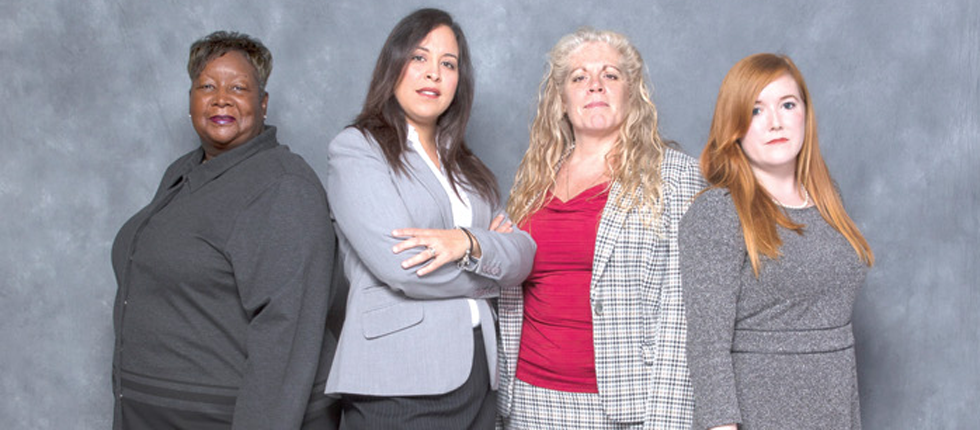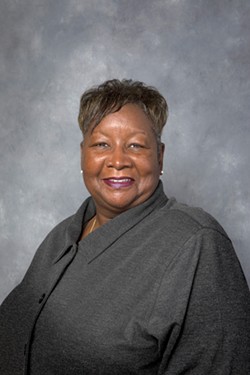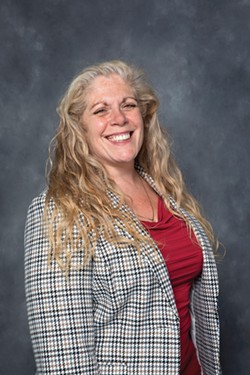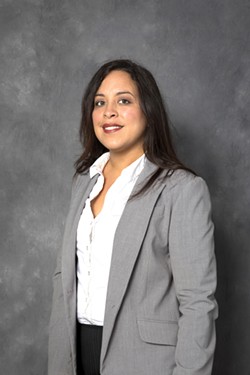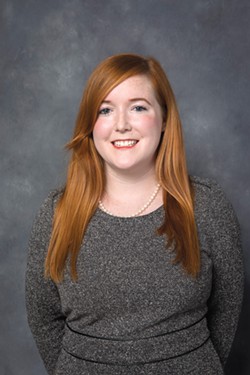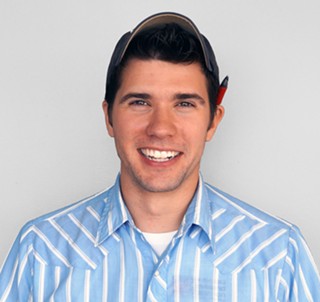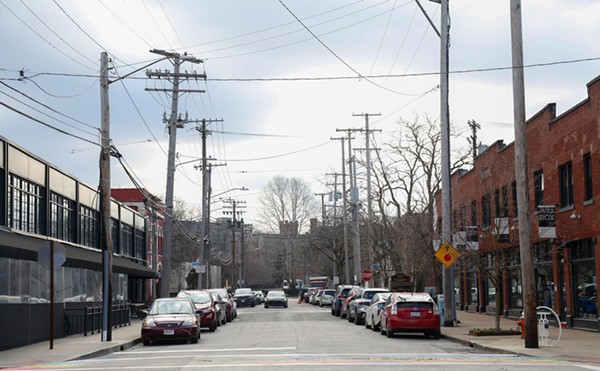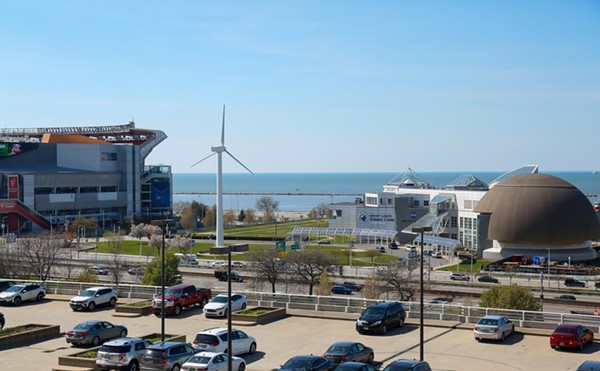When Ward 6 Councilwoman Mamie Mitchell stepped down for health reasons in May, she hand-selected the city's community relations director, Blaine Griffin, to replace her. Much of the backroom conversation at the time concerned the logistics of that decision: Mitchell had been ill for quite awhile. Why bother appointing Griffin with only four months, including the summer recess, remaining in the term? Why not retire gracefully by simply not seeking re-election?
Many of the Ward 6 council challengers, who had sniffed out Griffin's appointment long before it was public, saw the maneuver as an ugly and all-too-familiar staple: Councilpeople cling to power for as long as they can, opponents complained, and then they choose their own successors, making a mockery of the democratic process.
But other observers noticed something else. With the departure of Mitchell and the arrival of Griffin, a stark imbalance on council was drawn into even starker relief. There were now only two women on the 17-member body: Ward 5's Phyllis Cleveland and Ward 11's Dona Brady.
Even before the departure of Mitchell, Cleveland City Council had a worse gender gap than the city councils of all but one of the country's 10 largest cities. (In Los Angeles, there is only one woman on a 14-member body). But without Mitchell, Cleveland was approaching the bottom of the barrel in yet another ignominious category. To make matters worse, Phyllis Cleveland faced a stiff challenge in her September primary race, against the Boys and Girls Club's Richard Starr. The possibility of only one woman on a body that is meant to represent a city of 385,000 loomed.
The history of women on Cleveland City Council is distinguished, though sadly limited. Only 38 women have ever held the office. In January 1924, Helen Green and Marie Wing were appointed as the first two women on the body. They each served single four-year terms.
The 1950s witnessed the long council tenures of Margaret McCaffery; Jean Murell Capers, the first African-American woman to serve; and Mercedes Cotner. In the '70s, there were powerhouse political names like Mary Rose Oakar and Mary Zone, the mother of current councilman Matt Zone. She assumed the west side seat of her husband Michael after his death in 1974 and stayed on through 1981. In the '80s and '90s, there was Fannie Lewis, of course, and Helen Knipe Smith and Odelia Robinson.
But female representation has declined precipitously during Frank Jackson's tenure as mayor. Or perhaps it has merely returned to its typical low. Jackson's swearing-in, in 2006, coincided with a high-water mark: Women then occupied six of the 21 total council seats, nearly 30 percent. We need not belabor the point, though we will, that "nearly 30 percent" is a disgraceful "high-water mark."
Nina Turner and Phyllis Cleveland were both serving their first terms. They joined Dona Brady, who'd been on council since her appointment in 1999; Sabra Pierce Scott, who had defeated Bill Patmon in 2002 with the aid of former mayor Michael White; Patricia Britt, who first took office in 1995; and Fannie Lewis, who'd been serving faithfully and vocally since 1980.
But by the end of 2008, Nina Turner had gone to the statehouse, to be replaced by Terrell Pruitt. Fannie Lewis had passed away, to be replaced, via special election, by T.J. Dow. When Sabra Pierce Scott abruptly departed in 2008, she appointed Shari Cloud to replace her, but Cloud only served eight months before she lost to Jeff Johnson. Patricia Britt also tapped a woman to replace her when she became council clerk: Mamie Mitchell.
On Nov. 7, voters in seven of Cleveland's wards will see a female candidate on the ballot for City Council. Dona Brady and Phyllis Cleveland will seek re-election, and five challengers will take on powerful incumbents. Scene spoke with all challengers but Shalira Taylor, in Ward 12, who did not respond to an attempt to set up an interview.
To our great disappointment, neither Phyllis Cleveland nor Dona Brady wanted to be involved in this coverage either. In fact, neither responded to our direct inquiries. They were made aware that we wanted to highlight the candidacies of all female council candidates. But only through a council spokesperson were we informed that neither would participate, for "differing reasons."
Here, then, are four of the female council challengers, taking on the man.
GAIL SPARKS - WARD 4
Gail Sparks, 54, is going up against the city's longest tenured councilman, Ken Johnson, in Ward 4. Johnson is a pony-tailed leisure-suit aficionado who first took office in 1980, the same year as Cleveland's longest-serving councilwoman, Fannie Lewis.
Shockingly, since Lewis's first term, only nine other councilwomen have served on the body, two of whom (Emily Lipovan, in 2005, and Shari Cloud, in 2008) were appointees who served less than a calendar year.
Sparks wants to increase that number. But more importantly, she wants Ken Johnson gone. She has been incensed over the incumbent's strong-arm campaign tactics. He sent mailers to residents before the primaries advising them that only he would be able to maintain critical funding for infrastructure and continue beloved programs for senior citizens.
"My opponents WILL NOT be able to continue any of our unique senior programs regardless of what they have told you," Johnson wrote. "My ward 4 programs are almost totally run by Councilman Johnson's volunteers. These dedicated residents have volunteered for me for many years. When I leave office—By Law—all of our unique Ward 4 programs (mowing grass and snow removal for both seniors and the disabled, holiday gift cards, and etc.) must end."
It was an outrageous statement — by law, these programs must end? — and Sparks said that Johnson was exploiting seniors and "holding them captive," and that he ought to be reported to the ethics commission. More recently, a PAC calling itself the the Friends of Good Government Against Fake Politicians put out a mailer with lies about Sparks. The return address was fraudulently listed as Sparks' own campaign office.
For her part, Sparks told Scene, politics has been in her blood for decades. She joked that she ran for class president at Corlett Elementary in the 1970s. Her mother was a precinct committeeperson and her parents were both active in the street club. Sparks is a lifelong Clevelander, "a native Buckeye," and an '81 alum of John Adams High. She now lives "a stone's throw from Zelma George" off MLK.
Sparks has worked in the County Department of Health and Human Services and, more recently, as an entrepreneur. She has a small business on Larchmere that sells apparel and accessories. Additionally, she and her husband own property, she said, and rent to low-income tenants.
She said that the biggest issues in Ward 4 are also probably the most visible.
"It's the same story. I've connected with almost 2,500 people and it's the same story echoing," she said. "It's the jobs and the transportation and the dilapidated housing."
She said Ken Johnson has been disconnected from his constituents for years, and that residents no longer feel that they have ears or eyes at City Hall.
"I think he's been taking our votes for granted and I think he needs to retire," she said. "He has no new ideas, no innovation, no creation. We have no ward meetings. We are disconnected. We have no way to bring grievances to his attention. And money is being misspent."
Sparks said Johnson seems to be preoccupied with spending money on a waterpark at the rec center which bears his name. How can you spend millions on enclosing a water park, Sparks wanted to know, with all the battered homes and the limited access to jobs?
When asked about her own policy priorities, she responded immediately.
"Job training programs and housing rehabilitation," she said, adding that it will be necessary to re-establish ward meetings to get feedback from residents about what types of specific programs they'd like to see. She also said that 23 percent of her ward does not have access to a car, and that transportation funding and policy need to be aggressively pursued.
Sparks said that whether or not her gender will be a factor on city council remains to be seen; it has not, though, on the campaign trail. She said that residents are often so disenfranchised it's been a challenge just to help them understand that they deserve fair representation, "that they can make their councilperson accountable and transparent."
And she said, from her point of view, that while women are a dominant force, particularly in the black community, communities need be represented fairly before leaders should be celebrated.
"Phyllis Cleveland is the only woman of color on city council," Sparks said, "and she's not representing us at all." Sparks said she suspected Phyllis Cleveland was under Council President Kevin Kelley's thumb, and cited her support of the dirt bike track, the Q Deal, and her opposition to a minimum wage increase as prime examples. Sparks said she sees herself differently.
"I'd follow in the footsteps of Zack [Reed] and Jeff [Johnson]," she said, and added that she wouldn't be afraid to represent her residents, even if it meant voting against council leadership. "I see myself as a cross between Maxine Waters and Fannie Lewis."
MICHELE BURK - WARD 13
Perhaps more than any other campaign, Michele Burk's was conceived as a direct rebuke to a sitting incumbent. Burk, 54, admitted that she hadn't prepared "a stump speech" and had only general ideas for improving her Old Brooklyn ward, where she's lived for four years. But she is animated in her distaste for her current representative, City Council President Kevin Kelley.
"Our councilman has stopped us from voting twice this year," Burk told Scene, when asked why she decided to run. (She was referencing the squashed minimum wage ballot initiative and the Q deal referendum.) "I took offense to that, especially because actually trying to get a hold of him was not an easy thing. I figured we need somebody who's going to represent the people, and not whatever interests he has in his ear."
Burk grew up in Willoughby, but has lived in Cleveland for 30 years. She now works in the accounting department at the Cuyahoga County Board of Developmental Disabilities and is an active member of her union, Service Employees International Union (SEIU) Local 1199. Burk said that she got involved in union activities almost as soon as she started working at the county, and that in doing so she experienced a kind of political awakening.
"I realized that local politics are so important," she said. "They affect our day-to-day even more than the upper echelons."
Other than candidate Alex Karrfault, who is challenging Matt Zone in Ward 15, Burk is the only candidate who is also an active member of SEIU, which has become a political force in town. Burk is in fact an executive board member, and her political platform hews closely to the priorities of that organization. She said she wants to "better people's lives" and spoke ardently about the Q Deal and the $15 minimum wage issue. On both of those critical issues, in her view, Kevin Kelley was on the wrong side.
"In my Plain Dealer [endorsement] interview, they said I got my facts wrong about the minimum wage, but I think they just disagreed," she said. (She added that she's been so bothered by the Plain Dealer's coverage that after she advanced in the primary, beating third-place finisher Rocco Crisafi by only seven votes, she didn't return a message when the paper called to see if she had anything to add.)
In Ward 13, Burk said the most important task for a councilperson is being open and responsive to residents. On specific issues, she said that the opioid problem is getting more prevalent in Old Brooklyn, but that she doesn't think pursuing legislation is the best way to combat it. "I don't think we can legislate against addiction," she said. "It's got to be more grassroots." (Burk worked at a local methodone clinic in the past, she said, and has seen the ravages of opioid addiction firsthand.)
Ward 13 isn't home to as many abandoned houses as other wards, Burk said, but it is home to old houses, full of lead-based paint. She said she wants to make sure lead legislation is executed. "And I don't think the burden should be put on homeowners. I think the burden should be put on the paint companies."
On council, Burk said she sees herself as a vocal dissident. And like most other challengers, she has been angered by council's rubber-stamp mentality. She also agreed that the number of women serving on council was far too low.
"There's another woman running, Gail Sparks," said Burk. "I'd love to be able to work with her."
JASMIN SANTANA - WARD 14
Jasmin Santana, 38, is taking on incumbent Brian Cummins in Ward 14. The race has become one of the city's tightest and most contentious — Santana was one of only two non-incumbents to win a ward primary in September. And the two campaigns, with their complex webs of support, haven't been shy about attack and subversion. In its endorsement of Cummins, the Plain Dealer aptly dubbed the race a "stew of distemper."
Cummins was elected to council in 2005, one of a minority who attained his position via election, not appointment. But Santana told Scene that after more than a decade with Cummins, "it's time for some Latino representation in the city's highest-concentrated Latino area.
"We have no Latino elected officials throughout the whole county," she said, "[to say nothing of] a Latina."
Santana is Puerto Rican, born on the border of Ohio City and Detroit-Shoreway. She was a student at West Tech during its final year and finished high school at Max Hayes. She moved to Ward 14 at age 14, she said, and has been there ever since.
She grew up with a single mom and now has two teenagers of her own. Despite what she calls the "neglect and deterioration" of Ward 14, she doesn't want to leave. "I want to see what I'm fighting for," she said.
Professionally, Santana has worked primarily in community outreach. From 2006 to 2013, she worked with MetroHealth, coordinating the first breast cancer education program for Latinas.
"These women were coming to Metro with late-stage breast cancer," Santana said. "Often, they had no health insurance and the language was a huge barrier."
Through health fairs, community events and door-knocking campaigns, more than 13,000 women were ultimately screened and many were certified to educate and train other women.
In 2016, Santana began working at the Hispanic Alliance, doing community work that she said built on her experience at MetroHealth. She worked on education campaigns related to lead abatement and supervised a pilot program for a local resident council: "Familias United for the Wellbeing of Our community. "
She said it was that experience that "tipped the iceberg" in her mind and convinced her that she should run for City Council.
"We were having conversations about displacement, gentrification and safety," she said. "And the majority of the participants were women. They wanted an environment where they can walk down the streets. Moms wanted safe parks. I saw these women getting civically engaged in the safety of our community. And these were women with many barriers, women who didn't even know what a board meeting or an agenda was."
In Cummins, Santana said she sees a politician who hasn't engaged the community in deep or culturally relevant ways.
"What I want to do is improve communication," she said. "As a mom, as a wife, as a sister, as a community worker, I'm bringing all these experiences to the table. I'm bringing a feminine lens. I'm bringing a Latino lens. And I think that's so important to bring change to Ward 14. That's not saying that I'm just trying to serve the Latino community. I don't try to put people in a box. I want to serve the community as a whole. I want to be more a public servant than a politician. I want to be a messenger in City Hall from the people of Ward 14."
As for citywide policy issues, health is at the top of her platform. She cited lead issues and opioids as concerns that she'd like to pursue with legislation, and mentioned the possibility of enhanced partnerships with hospitals to craft policy around opioid prescriptions. "I definitely want to get more involved in that process," she said.
But she said she wants to put the development and civic engagement of women at the top of her agenda, and said — though it should be obvious — that having more women in City Hall is critical to that mission.
"As women, we're natural nurturers. And we're able to switch hats," she said. "I've mastered changing my hats within one day: the mom hat, the wife hat, the community hat. All these hats shift quickly. That type of experience, and being goal-oriented — all of these things that you just grow up with as a woman — are valuable when you bring them to the table at City Hall. I'm going in there with fresh eyes, and I know that women want to be healthy and they want to feel safe."
ELLEN CLEARY - WARD 16
Ellen Cleary, 30, is a St. Joseph Academy alumna with deep ties to the west side. She's taking on incumbent Brian Kazy, who was appointed to his seat by departing Council President Martin Sweeney in 2014. Cleary told Scene she couldn't sit by and watch him get re-elected without a fight.
"In my mind, it's not a democracy if you just get to waltz right in," she said.
While this is her first time running for office, Cleary has worked in or adjacent to politics for many years. In high school, she volunteered at Dennis Kucinich's Lakewood office. In college, she worked for a Green Party Senate candidate in Illinois. She graduated from Loyola Chicago in 2010 and thereafter worked in San Francisco, managing a real estate firm worth $850 million. She returned to Cleveland to work on the Uptown Project — "my baby," she calls it — where she coordinated with public and private partners and gained experience in urban planning and economic development.
"I was surprised, though," she said, "by the lack of engagement by the city councilpeople."
That lack of engagement, Cleary argued, has resulted in declining quality of life for residents in Cleveland's neighborhoods on the east and west sides.
"I was away from Cleveland during the recession," she said. "And I was really shocked, when I came back, by the progress downtown and the obvious regression in areas like West Park, Bellaire-Puritas and Jefferson. Crime, poor infrastructure and vacant storefronts are now abundant in what were once very stable neighborhoods."
Cleary grew up in West Park. Her mom has been school teacher for 20-plus years at CMSD's Garfield Elementary, where Cleary started a youth arts camp for students when arts funding was slashed. Cleary's mom also started the neighborhood community garden, and Cleary proudly still maintains a plot. These days, she works at Case Western Reserve University as the Assistant Director of Housing.
While she has no personal beef with councilman Brian Kazy, Cleary said she worries that because he was appointed to his seat, he is beholden to council leadership.
"He can't be his own independent person," she said. "He's voted with everyone else 98 percent of the time. And I know they all caucus together, but still."
Cleary is a member of the Cuyahoga County Progressive Caucus and is endorsed by that group as well as the Cleveland Action Democrats. But she said she did not run at the behest or suggestion of any group. She decided to run on her own and is, at least for now, self-funding her campaign.
In addition to constituent services, Cleary said she's energetic about crafting sensible policy citywide. More legislative steps need to be taken to address the opioid crisis, she said. And industry-specific workforce training and development programs should be supported.
Ward 16 is home, for example, to PPG, the largest manufacturing and technical center for automotive coatings in North America. Cleary said that creating an adequately trained, not to mention healthy, workforce is good for businesses like PPG and good for Cleveland. Cleary said she's also interested in environmental legislation, lakefront development and the pursuit of national businesses in the innovation economy.
If elected, Cleary would join Ward 3's Kerry McCormack as the only other millennial on council.
And like the other female challengers taking on male incumbents, she's aware of the vast discrepancy in Cleveland's legislative body. So, too, are some of the voters in Ward 16.
"I've run into a lot of women who have said they will vote for me specifically because I'm a woman," she said. "And I've had other people who say, 'Tell your dad he should do X or Y.' They assume I'm not the candidate. There's definitely a lot of weird sexism that occurs, but I'd like to inspire people, to show them that, yes, being a councilperson is a huge responsibility, but that women can succeed in politics. Women can do it. I can do it."

